

Today we’d like to introduce you to Emlyn Koster.
Alright, so thank you so much for sharing your story and insight with our readers. To kick things off, can you tell us a bit about how you got started?
Born at a Royal Air Force family base in Egypt’s Suez Canal Zone, Raleigh has been home since 2013. Centrally interested in the world’s environmental and societal challenges, three interwoven pursuits over five decades have propelled my eclectic journey.
The first has been a career launched by BSc and PhD degrees in geology from the England’s University of Sheffield and Canada’s University of Ottawa, then leadership of four major nature and science museums: Alberta’s Royal Tyrrell Museum of Paleontology, the Ontario Science Centre in Toronto, Liberty Science Center in the New York metro region, and the North Carolina Museum of Natural Sciences. With a founding purpose to inspire reflection through collected and interpreted heritage, I view major museums in today’s troubled world as unique resources in service to regional, national and global needs. Inside the museum profession nowadays is a debate on whether its institutions should strive to be necessary or just nice. The big-picture-minded geologist in me does not view their needed relevance to consequential surrounding matters for all ages and stages of learning as an option.
The second is a global outlook rooted in British, Canadian and American citizenships with immersion in a variety of landscapes, including fieldwork in three UNESCO World Heritage Sites. Sprinkled through the earning of credentials and the demands of appointments, I have relished wilderness experiences such as rafting down the Colorado River in the Grand Canyon, advising on location about a new IMAX film in the Sea of Cortez region, and searching for dinosaurs in strata exposed across the Gobi Desert. These combine with vivid memories of learning experiences in diverse cultures. For example, I remain strongly influenced by opportunities to create partnerships with students, teachers and parents in at-risk districts around New York City and a trauma psychologist to uplift the region’s next-of-kin in the aftermath of the September 11, 2001 terrorist attack on Manhattan. Following an invitation to review an exhibition in Dubai about early contributions to scientific knowledge in the Islamic world before the Renaissance during the Middle Ages, my role in showcasing it in the New York region led to awards including Humanitarian of the Year in 2008 from the American Conference on Diversity. Detailed recollections have also enabled me to relearn from experiences in subsistence communities across western China and northern India.
The third is an application of several visionary philosophies. These include those of Aristotle who viewed leadership as the harmonious pursuit of positive consequences in the world; the Iroquois and Dakota Peoples whose Indigenous traditions are anchored in seven-generation and good-ancestor approaches; and the synthesis of Thomas Hofstadter who analyzed the visionary traits of the composer Bach, logician Gödel and artist Escher. In what may seem a jarring further example, I also learned a lot from Stephen Covey, author of ‘The 7 Habits of Highly Effective People’, who illustrated the bureaucratic-sounding terms of effectiveness and efficiency with a powerful metaphor of first deciding on the strongest wall to lean a ladder against and then deciding on the best way to climb it.
Since 2010 I have been focused on the optimal roles of the geology and museum professions to illuminate humanity’s escalating disruption of the Earth System. But it has always also been important to me to communicate research findings and opinions as journal articles, book chapters, thematic blogs, and conference presentations, including to the UN in Bonn and TEDMED in San Diego. Other outlets have been invited chairmanships of the nonprofit boards for the Geological Association of Canada, Giant Screen Industry Association, and Institute for Learning Innovation. As a member of the Ambassadors Circle for the International Coalition of Sites of Conscience, I strove over several years to parlay the benefits of this unique network into urgent attention by Raleigh’s Dorothea Dix Park to its Native American, African American, and mental health chapters of what is a nationally precious slice of history.
We all face challenges, but looking back would you describe it as a relatively smooth road?
Looking back at the twists and turns in my journey, I see clearly that what seemed to be big hurdles became fortuitous breakthroughs. I did not pass the UK’s exam for all 11-year-olds called the ‘Eleven-Plus’ which was intended to identify and separately stream those on track for a university degree. And when I was 18, I did not succeed through what was the UK’s standard protocol for undergraduate applications. Thankfully, a high school geography teacher who knew me well reached out to a faculty colleague and their mutual trust secured one of the last admission spots for me. Three years later, I graduated with a Special Honors BSc in geology and six years further, I earned a PhD degree without the usual intermediate step of a master’s degree. When I was researching what to share with graduating students at the University of Ottawa where I received an alumni award in 2019, an article in the journal Nature Communications titled ‘Early Career Setback and Future Career Impact’ caught my eye. Its opening sentence was “Setbacks are an integral part of a scientific career, yet little is known about their long-term effects”. It concluded that failures in the early phase of a career may mean one can come back stronger than those who never stumbled.
Appreciate you sharing that. What else should we know about what you do?
Highlights of my five years at the helm of the North Carolina Museum of Natural Sciences were its first satellite branch in Whiteville in a state-wide partnership context, its hosting of the largest-ever conference of the global Association of Science-Technology Centers, a national spotlight on its community service at the White House, and top rating of its standards by the American Alliance of Museums. A News & Observer editorial remarked: “The wise strategy of the state museum is to reach out to rural areas and in particular to the children of those regions to give them a taste of science, a chance to share in the wondrous world of the spectacular museum in downtown Raleigh”. The Greater Raleigh Convention and Visitors Bureau recognized the economic impact of the Museum with its annual Thad Eure, Jr. Memorial Award. The National Institute of Museum and Library Services remarked: “From programs that foster passion for science, literature and cultural heritage to critical 21st-century skills training for improved educational outcomes and workforce readiness, the services and programs of these institutions truly do make a difference”. And
peer site reviewers from Albuquerque and Los Angeles concluded that the North Carolina Museum of Natural Sciences “forthrightly evolved its interpretative philosophy and strategy to address bigger stories about humans as an inseparable element in the ecosystem of all life, and therefore to be concerned about matters of conservation and sustainability”. Liaising closely with head paleontologist Dr. Lindsay Zanno and exhibition lead Roy Campbell, it was a once-in-a-lifetime experience to attract the ‘Dueling Dinosaurs’ from Montana, rated by the Smithsonian Institution as “America’s most spectacular fossils”. With their customized preparation lab now under construction next to the Museum’s iconic Daily Planet globe, this experience should become a popular catalyst for a unique array of necessary learning opportunities for generations to come.
Alright so before we go can you talk to us a bit about how people can work with you, collaborate with you or support you?
I am deeply grateful to this area’s visionaries, especially Denny Edwards and Sig Hutchinson, for being such stalwart partners to the vision that unfolded here and to Clodagh Lyons-Bastian for suggesting my profile to Voyage Raleigh.












